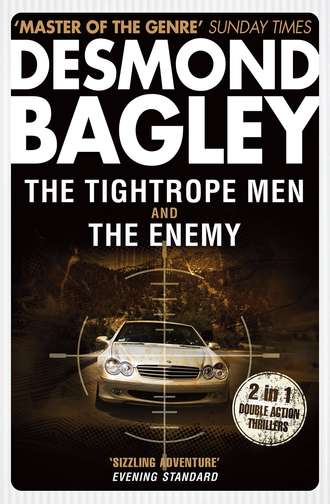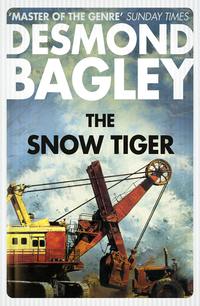
Полная версия
The Tightrope Men / The Enemy
‘On a stretcher – he must have been unconscious.’
‘Right!’ said Carey. ‘A hospital patient in transit under the supervision of a trained nurse and probably a doctor. And they’d have taken a room on the same floor as Meyrick. The switch was made and Meyrick taken out yesterday morning – probably in an ambulance at the back entrance of the hotel by arrangement with the management. Hotels don’t like stretchers being paraded through the front lobby.’
‘I’ll get on to it,’ said McCready. ‘It might be an idea to check on all the people who booked in on the previous day, regardless of the floor they stayed on. I don’t think this was a two man job.’
‘I don’t, either. And you check the comings and goings for the past week – somebody must have been watching Meyrick for a long time.’
‘That’s a hell of a big job,’ objected McCready. ‘Do we get the co-operation of the Norwegians?’
Carey pondered. ‘At this time – no. We keep it under wraps.’
McCready’s face took on a sad look at the thought of all the legwork he was going to have to do. Carey tilted his chair back. ‘And then there’s the other end to be checked – the London end. Why Giles Denison of Hampstead?’ His chair came down with a thump. ‘Hasn’t it struck you that Denison has been very unforthcoming?’
McCready shrugged. ‘I haven’t talked to him all that much.’
‘Well, look,’ said Carey. ‘Here we have this man in this bloody odd situation in which he finds himself. After recovering from the first shock, he not only manages to deceive Mrs Hansen as to his real identity but he has the wit to ring up Meyrick’s home. But why only Meyrick? Why didn’t he check back on himself?’
‘How do you mean?’
Carey sighed. ‘There’s a man called Giles Denison missing from Hampstead. Surely he’d be missed by someone? Even if Denison is an unmarried orphan he must have friends – a job. Why didn’t he ring back to reassure people that he was all right and still alive and now living it up in Oslo?’
‘I hadn’t thought of that,’ admitted McCready. ‘That’s a pointer to his being Meyrick, after all. Suffering from delusions but unable to flesh them out properly.’
Carey gave a depressed nod. ‘All I’ve had from him is that he’s Giles Denison from Hampstead – nothing more.’
‘Why not put it to him now?’ suggested McCready.
Carey thought about it and shook his head. ‘No, I’ll leave that to the psychiatrist. If this is really Meyrick, the wrong sort of questions could push him over the edge entirely.’ He pulled the note pad towards him again. ‘We’ll have someone check on Denison in Hampstead and find out the score.’ He ripped off the sheet. ‘Let’s get cracking. I want those cables sent to London immediately – top priority and coded. I want those quacks here as fast as possible.’
EIGHT
Giles Denison stirred his coffee and smiled across the table at Diana Hansen. His smile was steady, which was remarkable because a thought had suddenly struck him like a bolt of lightning and left him with a churning stomach. Was the delectable Diana Hansen who faced him Meyrick’s mistress?
The very thought put him into a dilemma. Should he make a pass or not? Whatever he did – or did not – do, he had a fifty per cent chance of being wrong. The uncertainty of it spoiled his evening which had so far been relaxing and pleasant.
He had been driven back to the hotel in an Embassy car after dire warnings from George McCready of what would happen to him if he did not obey instructions. ‘You’ll have realized by now that you’ve dropped right into the middle of something awkward,’ said McCready. ‘We’re doing our best to sort it out but, for the next couple of days, you’d do well to stay in the hotel.’ He drove it home by asking pointedly, ‘How’s your side feeling now?’
‘Better,’ said Denison. ‘But I could have done with a doctor.’ He had been strapped up by McCready, who had produced a first-aid box and displayed a competence which suggested he was no stranger to knife wounds.
‘You’ll get a doctor,’ assured McCready. ‘Tomorrow.’
‘I have a dinner date,’ said Denison. ‘With that redhead I told you about. What should I do about that? If she goes on like she did yesterday I’m sure to put my foot in it.’
‘I don’t see why you should,’ said McCready judiciously.
‘For God’s sake! I don’t even know her name.’
McCready patted him on the shoulder, and said soothingly, ‘You’ll be all right.’
Denison was plaintive. ‘It’s all very well you wanting me to go on being Meyrick but surely you can tell me something. Who is Meyrick, for instance?’
‘It will all be explained tomorrow,’ said McCready, hoping that he was right. ‘In the meantime, go back to the hotel like a good chap, and don’t leave it until I call for you. Just have a quiet dinner with … with your redhead and then go to bed.’
Denison had a last try. ‘Are you in Intelligence or something? A spy?’
But to that McCready made no answer.
So Denison was delivered to the hotel and he had not been in the room more than ten minutes when the telephone rang. He regarded it warily and let it ring several times before he put out his hand as though about to pick up a snake. ‘Yes?’ he said uncommunicatively.
‘Diana here.’
‘Who?’ he asked cautiously.
‘Diana Hansen, who else? We have a dinner date, remember? How are you?’
Again he caught the faint hint of America behind the English voice. ‘Better,’ he said, thinking it was convenient of her to announce her name.
‘That’s good,’ she said warmly. ‘Are you fit enough for dinner?’
‘I think so.’
‘Mmm,’ she murmured doubtfully. ‘But I still don’t think you should go out; there’s quite a cold wind. What about dinner in the hotel restaurant?’
Even more convenient; he had just been about to suggest that himself. In a more confident voice he said, ‘That’ll be fine.’
‘Meet you in the bar at half past seven,’ she said.
‘All right.’
She rang off and he put down the telephone slowly. He hoped that McCready was right; that he could manage a sustained conversation with this woman in the guise of Meyrick. He sat in the armchair and winced as pain stabbed in his side. He held his breath until the pain eased and then relaxed and looked at his watch. Half past five. He had two hours before meeting the Hansen woman.
What a mess! What a stinking mess! Lost behind another man’s face, he had apparently dropped into the middle of an intrigue which involved the British government. That man, Carey, had been damned patronizing about what had happened on top of the Spiralen and had not bothered to hide his disbelief. It had been that, more than anything else, that had driven Denison into disclosing who he was. It had certainly taken the smile off Carey’s face.
But who was Carey? To begin with, he was obviously McCready’s boss – but that did not get him very far because who was McCready? A tight little group in the British Embassy in Oslo dedicated to what? Trade relations? That did not sound likely.
Carey had made it clear that he had warned Meyrick not to move far from the hotel. Judging by what had happened on the Spiralen the warning was justified. But who the hell was Meyrick that he was so important? The man with the title of Doctor or perhaps Professor, and who was described on his passport as a civil servant.
Denison’s head began to ache again. Christ! he thought; I’ll be bloody glad to get back to Hampstead, back to my job and the people I …
The thought tailed off to a deadly emptiness and he felt his stomach lurch. A despairing wail rose in his mind – God help me! he cried silently as he realized his mind was a blank, that he did not know what his job was, that he could not put a name to a single friend or acquaintance, and that all he knew of himself was that he was Giles Denison and that he came from Hampstead.
Bile rose in his throat. He struggled to his feet and staggered to the bathroom where he was violently sick. Again there was that insistent beat in his mind: I AM GILES DENISON. But there was nothing more – no link with a past life.
He left the bathroom and lay on the bed, staring at the ceiling. You must remember! he commanded himself. You must! But there was nothing – just Giles Denison of Hampstead and a vague mind picture of a house in a half-forgotten memory.
Think!
The scar on his shin – he remembered that. He saw himself on the small child-size bicycle going down a hill too fast, and the inevitable tumble at the bottom – then the quick tears and the comfort of his mother. I remember that, he told himself in triumph.
What else? Beth – he remembered Beth who had been his wife, but she had died. How many years ago was it? Three years. And then there was the whisky, too much whisky. He remembered the whisky.
Denison lay on the bed and fought to extract memories from a suddenly recalcitrant mind. There was a slick sheen of sweat on his brow and his fists were clenched, the nails digging into his palms.
Something else he had remembered before. He had come back from Edinburgh on June 17, but what had he been doing there? Working, of course, but what was his work? Try as he might he could not penetrate the blank haze which cloaked his mind.
On June 18 he had played golf in the afternoon. With whom? Of course it was possible for a man to play a round of golf alone, and also to go to the cinema alone and to dine in Soho alone, but it was hardly likely that he would forget everything else. Where had he played golf? Which cinema did he go to? Which restaurant in Soho?
A blazing thought struck him, an illumination of the mind so clear that he knew certainly it was the truth. He cried aloud, ‘But I’ve never played golf in my life!’
There was a whirling spiral of darkness in his mind and, mercifully, he slept.
NINE
Denison walked into the bar at a quarter to eight and saw the woman who called herself Diana Hansen sitting at a table. He walked over and said, ‘Sorry I’m late.’
She smiled and said lightly, ‘I was beginning to think I was being stood up again.’
He sat down. ‘I fell asleep.’
‘You look pale. Are you all right?’
‘I’m fine.’ There was a vague memory at the back of his mind which disturbed him; something had happened just before he had fallen asleep. He was reluctant to probe into it because he caught a hint of terror and madness which frightened him. He shivered.
‘Cold?’ Her voice was sympathetic.
‘Nothing that a stiff drink won’t cure.’ He beckoned to a passing waiter, and raised his eyebrows at her.
‘A dry Martini, please.’
He turned to the hovering waiter. ‘A dry martini and … do you have a scotch malt?’ Normally he bought the cheapest blend he could buy in the cut-price supermarkets but with Meyrick’s finances behind him he could afford the best.
‘Yes, sir. Glenfiddich?’
‘That will do fine. Thank you.’
Diana Hansen said, ‘Food may be better than drink. Have you eaten today?’
‘Not much.’ Just the meal in the police station at Drammen, taken for fuel rather than pleasure.
‘You men!’ she said with scorn. ‘No better than children when left on your own. You’ll feel better after dinner.’
He leaned back in his chair. ‘Let’s see – how long have we known each other, Diana?’
She smiled. ‘Counting the days, Harry? Nearly three weeks.’
So he had met her in Oslo – or, rather, Meyrick had. ‘I was just trying to find out how long it takes a woman to become maternal. Less than three weeks, I see.’
‘Is that the scientific mind at work?’
‘One aspect of it.’ Could that mean anything? Was Dr Meyrick a scientist – a government boffin?
She looked across the room and a shadow seemed to darken her face momentarily. ‘There’s Jack Kidder and his wife.’
Denison paused before he turned round. ‘Oh! Where?’
‘Just coming in.’ She put out her hand and covered his. ‘Do you want to be bothered by them, darling? He’s a bit of a bore, really.’
Denison looked at the tall, fleshy man who was escorting a petite woman. Jack Kidder was the name Diana Hansen had mentioned when he had bumped into her outside the bookshop. If she did not want to mix with the Kidders it was all right with him; he had enough to cope with already. He said, ‘You’re right. I don’t think I could cope with a bore tonight.’
She laughed. ‘Thanks for the compliment – hidden though it was. I’ll put him off tactfully if he comes across.’ She sighed theatrically. ‘But if he says that damned slogan of his again I’ll scream.’
‘What’s that?’
‘You must have heard it. It’s when he pulls off one of his dreadful jokes.’ She burlesqued an American accent. ‘“You know me – Kidder by name and kidder by nature.”’
‘Jack was always the life and soul of the party,’ said Denison drily.
‘I don’t know how Lucy puts up with him,’ said Diana. ‘If you can talk about a hen-pecked husband, can you refer to a cock-pecked wife?’
Denison grinned. ‘It sounds rude.’ Diana Hansen was making things easy for him. She had just given him a thumbnail sketch of the Kidders, including names and temperaments. It could not have been done better if done deliberately.
The waiter put the drinks on the table and Denison found he had a scotch on the rocks, a desecration of good malt. He did not feel like making a fuss about it so he raised his glass. ‘Skal!’ He sipped the whisky and reflected that this was the first real drink he had had since his transformation into Meyrick.
The familiar taste bit at his tongue and somehow released a wave of memories which washed through him tumultuously, tantalizingly close to the surface of his mind. And with the memories, unrealized though they were, came the fear and the terror which set his heart thumping in his chest. Hastily he set down the glass, knowing he was close to panic.
Diana Hansen looked at his shaking fingers. ‘What’s the matter, Harry?’
Denison covered up. ‘I don’t think a drink is a good idea, after all. I’ve just remembered I’m stuffed full of pills.’ He managed a smile. ‘If you shook me I’d rattle. I don’t think they’d mix with alcohol.’
She put down her glass. Then let’s have dinner before the Kidders catch up with us.’ She stood up and took her handbag from the table. Denison arose and they moved towards the entrance, but then she turned her head and murmured, Too late, I’m afraid.’
Kidder was also standing up, his big body blocking the way. ‘Hey, Lucy, look who’s here. It’s Diana and Harry.’
‘Hallo, Jack,’ said Denison. ‘Had a good day?’
‘We’ve been up to Holmenkollen; you know – the big ski-jump you can see from all over the city. It’s quite a thing when you get up to it close. Can you imagine, it’s only used once a year?’
‘I can’t imagine,’ said Denison blandly.
Lucy Kidder said, ‘And we went to the Henie-Onstad Art Centre, too.’
‘Yeah, modern art,’ said Kidder disparagingly. ‘Harry, can you make any sense out of Jackson Pollock?’
‘Not much,’ said Denison.
Kidder turned on his wife. ‘Anyway, why the hell do we have to come to Norway to see an American artist?’
‘But he’s internationally famous, Jack. Aren’t you proud of that?’
‘I guess so,’ he said gloomily. ‘But the locals aren’t much better. Take the guy with the name like a breakfast food.’ Everyone looked at Kidder with blank faces and he snapped his fingers impatiently. ‘You know who I mean – the local Scowegian we saw yesterday.’
Lucy Kidder sighed. ‘Edvard Munch,’ she said resignedly.
‘That’s the guy. Too gloomy for me even if you can see the people in his pictures,’ said Kidder.
Diana cut in quickly. ‘Harry’s not been feeling too well lately. I’m taking him in to an early dinner and sending him right to bed.’
‘Gee, I’m sorry to hear that,’ said Kidder. He sounded sincere.
‘There’s a lot of this two-day flu about,’ said his wife. ‘And it can be nasty while it lasts. You look after yourself – hear?’
‘I don’t think it’s too serious,’ said Denison.
‘But we’d better go in to dinner,’ said Diana. ‘Harry hasn’t eaten a thing all day.’
‘Sure,’ said Kidder, standing aside. ‘I hope you feel better real soon. You look after him, Diana.’
Over dinner they talked in generalities, much to Denison’s relief, and he was able to hold his own without much effort. There was not a single thing to trouble him until the coffee was served and that startling thought about the possible relationship between Diana and Meyrick came into his head. He looked at her speculatively and wondered what to do. For all he knew, Meyrick was an old ram.
He held the smile on his face and stirred his coffee mechanically. A waiter came to the table. ‘Mrs Hansen?’
Diana looked up. ‘Yes.’
‘A telephone call.’
‘Thank you.’ She looked at Denison apologetically. ‘I told someone I’d be here. Do you mind?’
‘Not at all.’ She stood up and left the restaurant, going into the lobby. He watched her until she was out of sight and then stopped stirring his coffee and put the spoon in the saucer with a clink. Thoughtfully he looked at the handbag on the other side of the table.
Mrs Hansen! He could bear to know more about that. He stretched out his hand slowly and picked up the handbag, which was curiously heavy. Holding it on his lap, below the level of the table, he snapped open the catch and bent his head to look inside.
When Diana came back the bag was back in its place. She sat down, picked it up, and took out a packet of cigarettes. ‘Still not smoking, Harry?’
He shook his head. ‘They still taste foul.’
Soon thereafter he signed the bill and they left, parting in the lobby, he to go to bed and she to go to wherever she lived. He had decided against making a pass at Mrs Diana Hansen because it was most unlikely that Dr Harold Feltham Meyrick would be having an affaire with a woman who carried a gun – even if it was only a small gun.
TEN
The next day was boring. He obeyed instructions and stayed in the hotel waiting to hear from McCready. He breakfasted in his room and ordered English newspapers. Nothing had changed – the news was as bad as ever.
At mid-morning he left the room to allow the maid to clean up, and went down to the lobby where he saw the Kidders at the porter’s desk. He hung back, taking an inordinate interest in a showcase full of Norwegian silver, while Kidder discussed in a loud voice the possibilities of different bus tours. Finally they left the hotel and he came out of cover.
He discovered that the bookshop on the corner of the street had a convenient entrance inside the hotel, so he bought a stack of English paperbacks and took them to his room. He read for the rest of the day, gutting the books, his mind in low gear. He had a curious reluctance to think about his present predicament and, once, when he put a book aside and tried to think coherently, his mind skittered about and he felt the unreasoning panic come over him. When he picked up the book again his head was aching.
At ten that night no contact had been made and he thought of ringing the Embassy and asking for McCready but the strange disinclination to thought had spread to action and he was irresolute. He looked at the telephone for a while, and then slowly undressed and went to bed.
He was almost asleep when there was a tap at his door. He sat up and listened and it came again, a discreet double knock. He switched on the light and put on Meyrick’s bathrobe, then went to the door. It was McCready, who came in quickly and closed the door behind him. ‘Ready for the doctor?’ he asked.
Denison frowned. ‘At this time of night?’
‘Why not?’ asked McCready lightly.
Denison sighed. It was just one more mystery to add to the others. He reached for his underwear and took off the bathrobe. McCready picked up the pyjamas which were lying neatly folded on top of the suitcase. ‘You don’t wear these?’
‘Meyrick did.’ Denison sat on the edge of the bed to put on his socks. ‘I don’t.’
‘Oh!’ McCready thoughtfully tugged at his ear.
When Denison picked up his jacket he turned to McCready. ‘There’s something you ought to know, I suppose. Diana Hansen carries …’
‘Who?’ asked McCready.
‘The redhead I took to dinner – her name is Diana Hansen. She carries a gun.’
McCready went still. ‘She does? How do you know?’
‘I looked in her handbag.’
‘Enterprising of you. I’ll tell Carey – he’ll be interested.’ McCready took Denison by the arm. ‘Let’s go.’
McCready’s car was in the garage and when he drove out into the street he turned left which Denison knew was away from the Embassy. ‘Where are we going?’
‘Not far,’ said McCready. ‘Five minutes. Possess your soul in patience.’
Within two minutes Denison was lost. The car twisted and turned in the strange streets until his sense of direction deserted him. Whether McCready was deliberately confusing him he did not know, but he thought it likely. Another possibility was that McCready was intent on shaking off any possible followers.
After a few minutes the car pulled up outside a large building which could have been a block of flats. They went inside and into a lift which took them to the fifth floor. McCready unlocked a door and motioned Denison inside. He found himself in a hall with doors on each side. McCready opened one of them, and said, ‘This is Mr Iredale. He’ll fix up your side for you.’
Iredale was a sallow, middle-aged man, balding and with deep grooves cut from the base of his nose to the corners of his mouth. He said pleasantly, ‘Come in, Mr Denison; let me have a look at you.’
Denison heard the door close behind him and turned to find that McCready had already gone. He whirled around to confront Iredale. ‘I thought I was being taken to a doctor.’
‘I am a doctor,’ said Iredale. ‘I’m also a surgeon. We surgeons have a strange inverted snobbery – we’re called “mister” and not “doctor”. I’ve never known why. Take off your coat, Mr Denison, and let me see the damage.’
Denison hesitated and slowly took off his jacket and then his shirt. ‘If you’ll lie on the couch?’ suggested Iredale, and opened a black bag which could only have been the property of a doctor. Somewhat reassured, Denison lay down.
Iredale snipped away the bandages with a small pair of scissors and examined the slash. ‘Nasty,’ he said. ‘But clean. It will need a local anaesthetic. Are you allergic to anaesthetic, Mr Denison?’
‘I don’t know – I don’t think so.’
‘You’ll just feel three small pricks – no more.’ Iredale took out a hypodermic syringe and filled it from a small phial. ‘Lie still.’
Denison felt the pricks, and Iredale said, ‘While we’re waiting for that to take effect you can sit up.’ He took an ophthalmoscope from his bag. ‘I’d just like to look at your eyes.’ He flashed a light into Denison’s right eye. ‘Had any alcohol lately?’
‘No.’
Iredale switched to the left eye upon which he spent more time. ‘That seems to be all right,’ he said.
‘I was stabbed in the side, not hit on the head,’ said Denison. ‘I don’t have concussion.’
Iredale put away the ophthalmoscope. ‘So you have a little medical knowledge.’ He put his hands to Denison’s face and palpated the flesh under the chin. ‘You know what they say about a little knowledge.’ He stood up and looked down at the top of Denison’s head, and then his fingers explored the hairline. ‘Don’t knock the experts, Mr Denison – they know what they’re doing.’
‘What sort of a doctor are you?’ asked Denison suspiciously.
Iredale ignored that. ‘Ever had scalp trouble? Dandruff, for instance?’
‘No.’
‘I see. Right.’ He touched Denison’s side. ‘Feel anything?’
‘It’s numb but I can feel pressure.’
‘Good,’ said Iredale. ‘I’m going to stitch the wound closed. You won’t feel anything – but if you do then shout like hell.’ He put on rubber gloves which he took out of a sealed plastic bag and then took some fine thread out of another small packet. ‘I’d turn your head away,’ he advised. ‘Lie down.’









